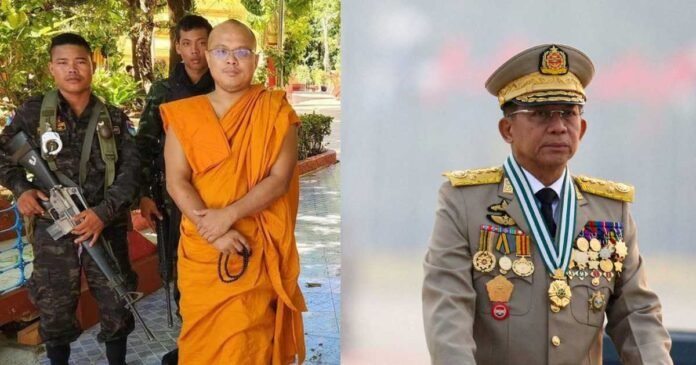In the bustling main square of Pyin Oo Lwin, Myanmar, a bespectacled monk, Pauk Ko Taw, usually aligned with the military junta, shocked a crowd by suggesting that Min Aung Hlaing step aside, allowing his deputy General Soe Win to take charge. This rare criticism stems from recent defeats suffered by the army at the hands of ethnic insurgents, prompting even erstwhile supporters to reconsider.
Pyin Oo Lwin’s significance, home to the prestigious Defence Services Academy, sends a strong message to the military top brass – a subtle warning that their support is dwindling. While the military-monk alliance is not new, recent events have strained these ties, leading some monks, traditionally aligned with the generals, to express frustration with the junta’s inability to quell opposition forces.
The historical involvement of Burmese monks in political activism, both against and in collaboration with authorities, adds complexity to the current situation. The once-powerful Ma Ba Tha movement, linked to Wirathu, collaborated with the military to protect Buddhism and Burmese culture. Even after its official disbandment in 2017, military support continued, exemplified by Wirathu’s release and subsequent honors from Min Aung Hlaing.
Following the 2021 coup, Min Aung Hlaing sought to legitimize his rule by portraying himself as a champion of Buddhism. State media showcased his generous donations to temples and participation in religious events. However, this strategy faced backlash, especially from monks opposing the coup, with some even resorting to arms against the junta.
The formation of armed militia groups, like Pyusawhti, by monks like Wathawa, reveals the widening cracks in military support. These militias, accused of recruiting through coercion and committing atrocities, have struggled to counter the organized opposition to military rule. The military’s recent defeats at the hands of ethnic insurgents further contribute to doubts about Min Aung Hlaing’s competence, with one prominent blogger labeling him as “incompetent.”
The Brotherhood Alliance’s success in seizing territory in northern Shan State and the Arakan Army’s control of military bases near the Bangladesh border highlight the army’s retreat and loss of strategic positions. The military’s reliance on helicopters for supply drops and air strikes has led to civilian casualties, intensifying the criticism.
The unprecedented reverses in the military’s historical campaigns against insurgents have shattered morale and made recruitment challenging. Discontent is growing among soldiers and their traditional allies, raising questions about the sustainability of the junta’s rule.
Pauk Ko Taw’s outspoken criticism, coupled with reports of General Soe Win’s dissatisfaction with troop performance, suggests internal discontent. However, Min Aung Hlaing’s ability to sideline potential rivals and his strategic political maneuvers make a significant internal challenge unlikely in the short term.
The absence of a clear successor adds to the uncertainty. Despite battlefield defeats and growing dissent, Min Aung Hlaing continues to project an air of authority reminiscent of a monarch. Whether this stems from confidence or detachment from reality remains unclear. However, the military’s inability to endure further losses raises the specter of potential regime implosion if key territories fall to insurgents. The once-unified front of military and monkhood appears increasingly fractured, posing a formidable challenge to the junta’s stability.
